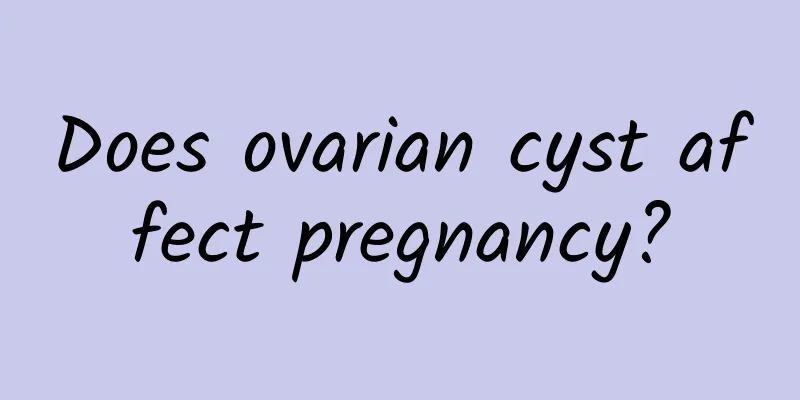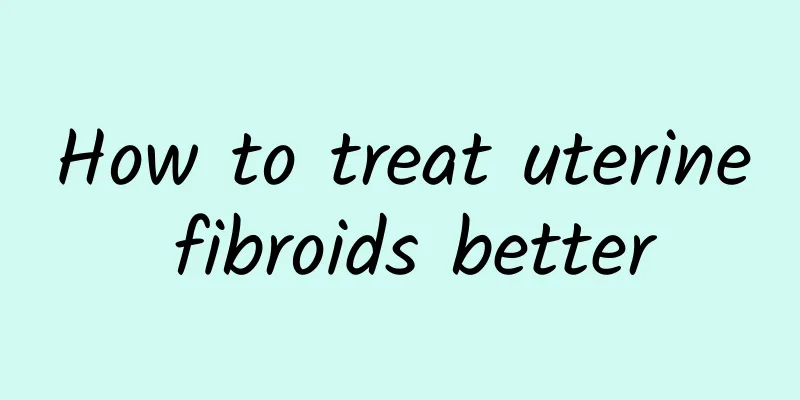Specific symptoms of uterine fibroids What is the best thing to eat if you have uterine fibroids

|
What are the specific symptoms of uterine fibroids? Uterine fibroids are a very common gynecological disease in today's society. The following is a detailed introduction to the symptoms of uterine fibroids. Uterine fibroids are the most common benign tumors in the female reproductive organs, mainly occurring in middle-aged women aged 30-50. Some uterine fibroids have no obvious symptoms, so it is difficult for many people to find them and they do not need treatment. But if some women have the following symptoms, they should go to the hospital to check whether they have uterine fibroids. Menstrual changes. When women have increased menstrual blood volume, prolonged menstruation, or irregular menstruation, it is best to go to the hospital to check whether there is a possibility of uterine fibroids. Menstruation not only reflects the health of the ovaries and uterus, but also reflects the health of the whole body, so women must pay attention to menstrual problems. Most patients with uterine fibroids have no clinical symptoms due to the slow growth of the tumor. However, if the fibroid is located low, even if the tumor is not large, it may compress the adjacent organs and cause symptoms such as frequent urination, difficulty urinating, or constipation. Abnormal vaginal discharge. Normal female vaginal discharge is a non-odorous, slightly acidic, viscous substance that moistens the vagina, excretes waste, and inhibits the growth of pathogens. It is a normal physiological phenomenon. Some women with uterine fibroids may experience intermittent vaginal bleeding or purulent vaginal discharge. Patients can feel a lump in the lower abdomen, especially when the bladder is full of urine. Uterine fibroids can cause a lot of inconvenience to patients' lives and work. If diagnosed with uterine fibroids, female friends are advised to go to a regular hospital to ask the doctor for specific treatment methods and actively treat them to prevent the tumor from continuing to expand. At the same time, you should also pay attention to eating less spicy and cold food, and pay attention to rest and physical exercise. The above is a brief introduction to the symptoms of uterine fibroids. I hope you can better understand the symptoms of uterine fibroids through our introduction. At the same time, I remind you that if the disease is found, it must be treated in time, and do not delay the condition and delay treatment. |
Recommend
What are the causes of cervical hypertrophy?
What are the causes of cervical hypertrophy? This...
What to do if uterine effusion occurs?
It is very necessary to check for uterine effusio...
Can cervical erosion be seen? Is it contagious?
Cervical erosion cannot be seen directly with the...
What does multiple cervical cysts mean?
What does it mean to have multiple cervical nabot...
How long does it usually take to regulate blood stasis amenorrhea?
Generally, it takes several months to half a year...
Can an enlarged cervix infect family members?
Cervical hypertrophy is not contagious to family ...
After ectopic pregnancy surgery, lower abdomen pain like dysmenorrhea
After ectopic pregnancy surgery, lower abdomen pa...
Slimming and light meals are popular: low-fat and high-fiber shrimp paste
The obesity rate among modern people is rising du...
Women must be aware of the symptoms of pelvic inflammatory disease in advance
Pelvic inflammatory disease is a gynecological di...
Do you always forget things after the holidays? Hit by "Post-Chinese New Year Syndrome"? Nutritionist: 7 nutrients to help get rid of brain fog
The Chinese New Year holiday has just ended, and ...
Can women with chronic cervicitis heal themselves? Patients with chronic cervicitis should pay attention to avoid delaying treatment
Chronic cervicitis cannot heal itself. This disea...
Experts reveal the causes of secondary dysmenorrhea in women
As dysmenorrhea becomes a more and more common di...
What are the treatments for vulvar leukoplakia?
What are the treatments for vulvar leukoplakia? T...
Late stage of cervicitis and exercise
The issue of late-stage cervicitis and exercise m...
What are the specific symptoms of cervicitis?
The symptoms of cervicitis vary according to diff...









